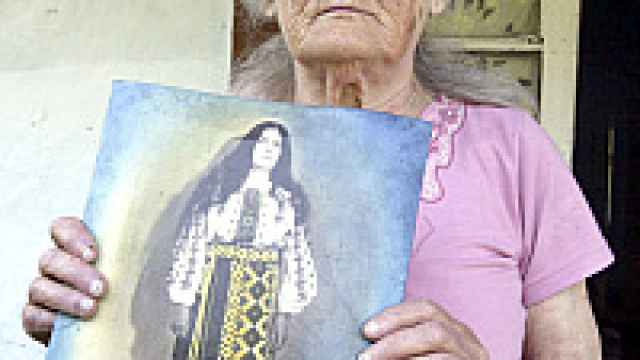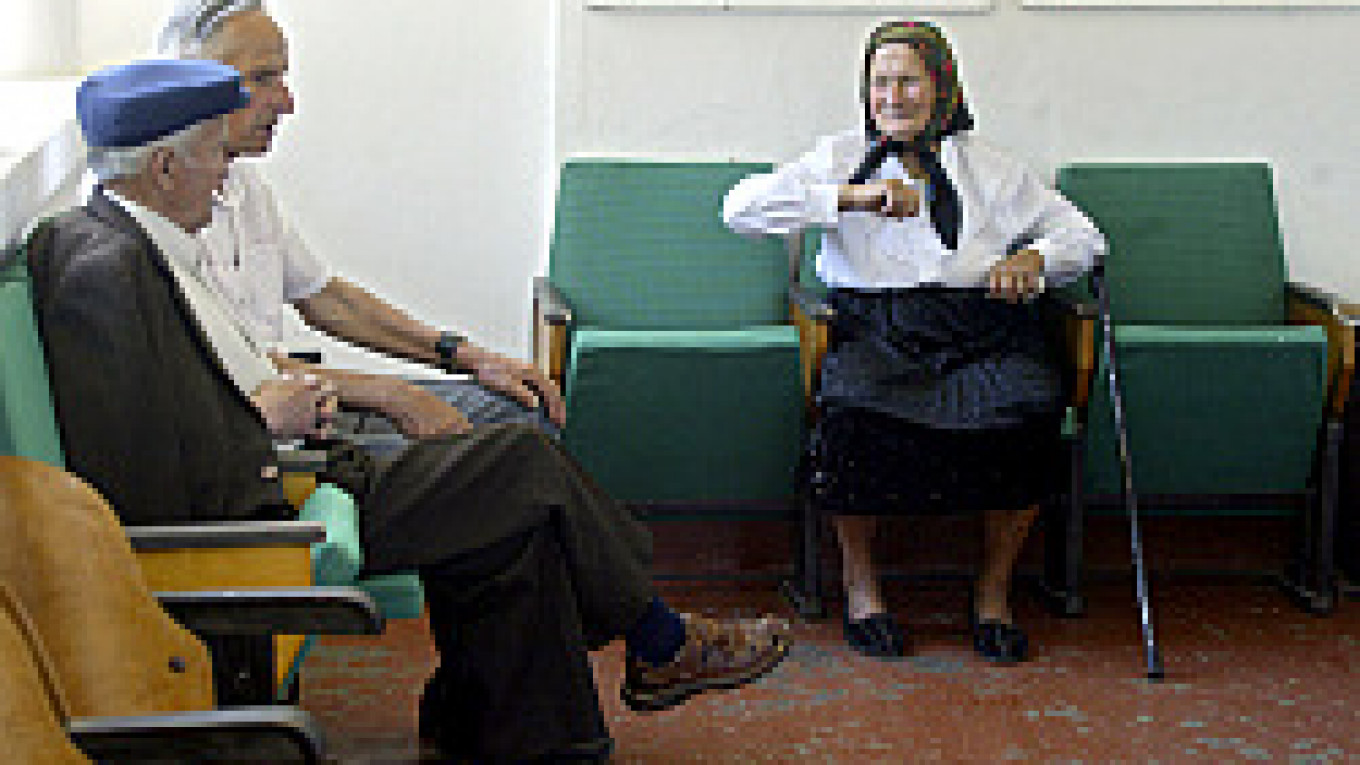A researcher stumbled on the inspiring story this year. Now some of Ukraine's Jewish leaders plan to raise a monument, host a delegation of students from Israel and stage a ceremony Wednesday honoring this small farming community in western Ukraine.
But 66 years later, there are conflicting accounts of what happened in Ispas during that terrible summer of 1941, when the Nazi invasion of the Soviet Union triggered an outbreak of anti-Semitic violence.
Residents and one survivor say the 2,000 villagers risked their lives for the sake of about 100 Jews, an account supported by some leaders of Ukraine's Jewish community and the scholar who uncovered the tale. But another survivor says there were no heroes in Ispas, and a leading Holocaust expert says that most of the Jews of Ispas were killed by fellow villagers.
At the start of World War II, Ukraine had a history of anti-Semitism, from the pogroms of the tsarist era to the silent discrimination of Soviet times. As Nazi troops and their Romanian allies began occupying western territories under Soviet rule, the ancient bigotry boiled over into cases of local residents robbing and killing their Jewish neighbors.
It was an early outburst of the savagery that became the Holocaust.
More than 2,100 Ukrainians have been cited by Israel's Yad Vashem Holocaust Memorial for rescuing Jews during the Holocaust, but these were mostly individual acts of heroism. The Ispas story -- if it could be confirmed -- would be a unique case of an entire community in Ukraine defending its Jews.
A leader of Ukraine's Jewish community has led a drive to honor the village, including celebrations in which Israeli students are expected to participate.
"We are very proud that our village didn't allow bloodshed, didn't allow Jews to be killed," said Vasylyna Kulyuk, a frail 80-year-old from Ispas.
She described two of her former Jewish classmates -- Geyntsya Rozenberg and Rifka Gerstel -- with tears in her eyes.
"We were in the same class and we shared bread," she said. "I would like so much at least to exchange letters with those girls. Only let them be alive."
 Efrem Lukatsky / AP Nadiya Vinnytska, daughter of an Orthodox priest, holding a photo of herself. | |
Rozenberg apparently perished during the war. But Rifka Gerstel survived. And she does not recall Ispas fondly.
Gerstel, now 79 and living outside Tel Aviv, said her neighbors did stop a gang of anti-Semites from killing the village's Jews -- but then some villagers turned around and robbed the Jews and drove them out of their homes.
"They came into the house and took everything," Gerstel said in a telephone interview. "We had such a beautiful house. We had a cow. We didn't say anything, because we were afraid for our lives. We knew that the Ukrainians slaughtered all the Jews in one of the villages nearby."
The next day, she said, the villagers marched the Jews away. Gerstel said she spent the rest of the war in a ghetto in central Ukraine. Her father, brother, grandfather and a baby nephew all died. "I suffered, I suffered very much," she said, her voice choking.
Told that Ispas was being honored for the treatment of its Jews, she said, "They don't deserve any monuments or any prizes."
There is no dispute over what happened in most of that area -- now western Ukraine -- that summer. Thousands of Jews were murdered and their houses looted. Those still alive were rounded up by Romanian troops and deported eastward to camps and ghettos. Some of them survived the war, but many were executed or died of starvation and disease, said Radu Ioanid, director for International Archival Programs at the U.S. Holocaust Memorial Museum.
Israel Minster, another member of Ispas' long-lost Jewish community, has a different recollection.
Minster, now 86 and living near Haifa, was staying in a neighboring village at the time of the attack, but other survivors later told him that the ethnic Ukrainians had rallied to the defense of the village Jews.
"In the neighboring village ... they cut everybody into pieces, they killed everyone," Minster said by telephone. "I was told that when [the thugs] came to Ispas, our village, the elder -- I know him, he is a decent [man] -- he didn't allow it."
Minster said he was unaware of looting in Ispas but that he heard through friends and neighbors that some residents of nearby areas had pillaged Jewish homes. "Not everybody helped. Some helped and some looted," he said.
Mykhailo Andryuk, head of the Ispas village council, said residents of his small community did not loot their neighbors' homes. Gerstel's house, he speculated, might have been on the outskirts of the village and attacked by the retreating anti-Semitic gang.
Several Ukrainian villagers who were children in 1941 said they vividly remembered that day.
Tanas Shtefyuk was 15 when he heard that the killers were approaching and hurried home to spread the news. Shtefyuk recalled that his crippled father, Ivan, summoned the village elders.
They made a difficult and dangerous choice, Shtefyuk said, to stand together against the marauders and protect the Jews who lived among them.
Nadiya Vinnytska's father, Volodymyr, was the village priest. He ran from his house to confront the attackers barefoot, Vinnytska said, because he didn't have time to put on his shoes.
"Calm down. I will not allow you to kill Jews," the priest said, according to Vinnytska, now 83. "They are the same people as us."
Alexei Shtrai, the independent Israeli scholar who uncovered the story, regards Ispas as an inspirational tale. "I believe the fact of saving Jews took place; we just have to prove it," Shtrai said.
The database of victims' names at Israel's Yad Vashem, based mainly on testimony given by survivors and relatives, often years after the event, lists four people as having died in Ispas. Seventeen to 46 villagers perished elsewhere, the records show, perhaps suggesting that some Ispas Jews survived the initial pogroms.
Yad Vashem's encyclopedia of Jewish communities of that area says most of Ispas' Jews were killed by the local population while the rest were deported eastward.
"The fact that the priest tried [to save the Jews] -- I can believe it," said Jean Ancel, a leading scholar on the Holocaust in the area who co-edited the encyclopedia.
"But the main question is -- were the Jews of Ispas saved or not? The answer is clear and without any doubt: they were murdered by their neighbors, by the local population," he said in an interview.
Scholars say some 1.4 million of Soviet Ukraine's 2.4 million Jews died in the Holocaust. Today about 400,000 live in Ukraine. No Jews remain in Ispas, residents said.
Oleksandr Feldman, head of the Kiev-based International Center for Tolerance, has urged Ukrainian President Viktor Yushchenko to honor Ispas for its actions during the Holocaust. The center plans to lay a stone in Ispas to commemorate the event.
Estee Yaari, spokeswoman for Yad Vashem, said the story of Ispas needed to be investigated further. "These are complex issues and events that took place, and in the absence of conclusive documentary evidence or conclusive testimonies it is difficult to know exactly what happened," she said.
A Message from The Moscow Times:
Dear readers,
We are facing unprecedented challenges. Russia's Prosecutor General's Office has designated The Moscow Times as an "undesirable" organization, criminalizing our work and putting our staff at risk of prosecution. This follows our earlier unjust labeling as a "foreign agent."
These actions are direct attempts to silence independent journalism in Russia. The authorities claim our work "discredits the decisions of the Russian leadership." We see things differently: we strive to provide accurate, unbiased reporting on Russia.
We, the journalists of The Moscow Times, refuse to be silenced. But to continue our work, we need your help.
Your support, no matter how small, makes a world of difference. If you can, please support us monthly starting from just $2. It's quick to set up, and every contribution makes a significant impact.
By supporting The Moscow Times, you're defending open, independent journalism in the face of repression. Thank you for standing with us.
Remind me later.


